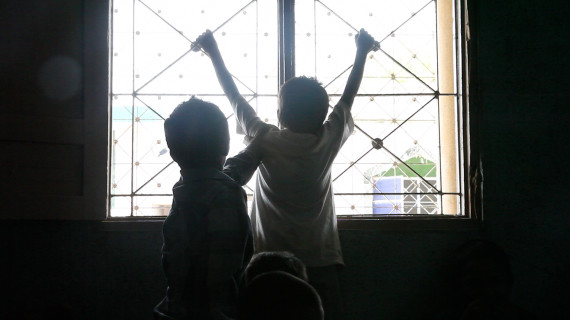The International Documentary Association (IDA) this week named the nominees for its documentary awards. At Nonfics.com, Christopher Campbell noted that Jason Osder’s LET THE FIRE BURN lead nominees in major categories, while Steve Pond had coverage at The Wrap. Adam Benzine had the news at Realscreen, while Anne Thompson did the same at Indiewire. In a blog post, POV also noted their nomination for the best continuing series award.
The film THESE BIRDS WALK from directors Bassam Tariq and Omar Mullick opened in theaters on Friday, winning a Critics Pick from New York Times writer Nicolas Rapold and a solid review from Scott Tobias at The Dissolve. Robert Greene wrote his own review for Hammer to Nail, as did Omer M. Mozaffar at RogerEbert.com. In a post at Indiewire, the pair wrote a piece sharing their ideas on how to make a documentary that evades social issue cliches. Tariq and Mullick were also featured on the latest episode of Adam Schartoff’s Filmwax podcast, while Tom Roston posed five questions for the pair in a post at the POV blog. Christopher Campbell and Daniel Walber also discussed the film in the latest episode of their podcast The Realness.
The folks at the True/False blog drew attention to a recently uploaded YouTube video documenting the festivals’ panel on doc criticism from earlier this year. The video’s posting seemed to provoke a response from Sam Adams of Indiewire, who wrote a piece asking if critics really understood documentary films.
This week Stranger Than Fiction is playing host to a screening of CALVET from director Dominic Allen on Tuesday, Nov. 5 at 8 p.m. at the IFC Center in Manhattan. Film subject Jean-Marc Calvet will be in attendance for a Q&A following the screening. For more information or to purchase tickets please go here.
Continue reading…

THESE BIRDS WALK opens on Friday, Nov. 1 at Village East Cinema in New York City.
If you’re here because you’ve heard about THESE BIRDS WALK and are trying to figure out if you want to watch it, let me save you the trouble. Just go see it. In addition to being a lovingly crafted example of an observational documentary, THESE BIRDS WALK is also a nuanced window into the lives of several people in Karachi, Pakistan, a part of the world that is too often to subjected to the sort of drive-by journalism that leaves Western audiences with a reductive and cartoonish view of the country’s people. Further, directors Omar Mullick and Bassam Tariq have delivered a much needed rebuke to journalist Nicolas Kristoff’s problematic rationale for the use of “bridge characters”–usually white or Western subjects whose presence is intended to give viewers of a similar background an empathic jumping off point for documentary work set in a world that’s unfamiliar to them.
Tariq and Mullick began their film with the intent to tell the story of the revered humanitarian figure Abdul Satar Edhi. However, Edhi’s soft resistance to documentation eventually led them to instead focus on several runaways who had sought shelter in Karachi at the Edhi Foundation, along with an ambulance driver who is compelled to help them despite his financial impulses to the contrary. I spoke with Tariq recently on audience expectations, the use of music as a tool for manipulation, and other subjects.
THESE BIRDS WALK starts a theatrical run on Friday, Nov. 1 at Village East Cinema, and Tariq and Mullick will be in attendance at all of the screenings this weekend, beginning with the one at 5:30 p.m. on Friday.
Stranger Than Fiction: You have a pretty varied background–I know you work in advertising and you’ve been a contributor to Boing Boing. You created a “transmedia” project called 30 Days/30 Mosques and another called 30 Days Ramadan. What made you want to take a more linear documentary approach to THESE BIRDS WALK?
Bassam Tariq: The funny thing is that THESE BIRDS WALK was in production or in pre-production before any of that stuff had happened. When I first came to New York I was just working in advertising. I think within a year I had the idea of making this film. The way film works–it just takes forever to get through one. You end up doing so many other things as you’re working on it. I think that’s the one thing I’ve realized, I can’t just do one thing. Some people focus on just one film, and it becomes their life. And that’s what ended up happening in post-production for us, we ended up just working on the film. But it’s very emotionally taxing as well because after you’re done with the film, if you don’t get the reception that you were looking for it’s really devastating. I think it’s hard not to have high expectations–or expectations at all–when you work on something. I think the best way to not have them is to have multiple projects going.
Continue reading…

First-time director Lotfy Nathan's 12 O' CLOCK BOYS is screening at SXSW this year.
For someone mired in New York City’s dark winter for far too long, South by Southwest holds the promise of warmer climes, reasonably priced barbeque and cold beer. This year–like any other–the festival’s programmers have put together a selection of non-fiction work designed to entice any self-proclaimed fan of documentary out of the sunshine and into a darkened theater. Here are five films I think are worth waiting in line for.
THESE BIRDS WALK (Visions) Last summer Filmmaker magazine anointed the duo of Omar Mullick and Bassam Tariq as among the 25 new faces of indie film, and for good reason. The pair earned a mountain of press for their 30 Mosques in 30 Days documentary project and its user-generated offshoot, 30 Days of Ramadan. Mullick and Tariq banned both voiceover and talking heads in the making of THESE BIRDS WALK, a portrait of a young runaway living in Karachi, over which hovers the story of Pakistani humanitarian Abdul Sattar Edhi. The film comes to Austin fresh from a screening at the True/False Film Fest, where it built both buzz and a solid base of support among viewers. Watch the trailer; if there’s a heart beating in your body I promise you will have goosebumps.
12 O’CLOCK BOYS (Feature Competition) Lotfy Nathan’s directorial debut ostensibly follows the not-quite-yet teenager Pug as he seeks to align himself with an outlaw dirt bike gang that runs roughshod over the streets of Baltimore. But the clear subtext of 12 O’CLOCK BOYS is the dire economic and class divisions that drive Charm City’s young bikers to define themselves oppositionally to the Baltimore police, along with pretty much any other established social institution. Nathan’s film ends with a major catharsis for his subject, but probably not in the way you’d expect.
Continue reading…








